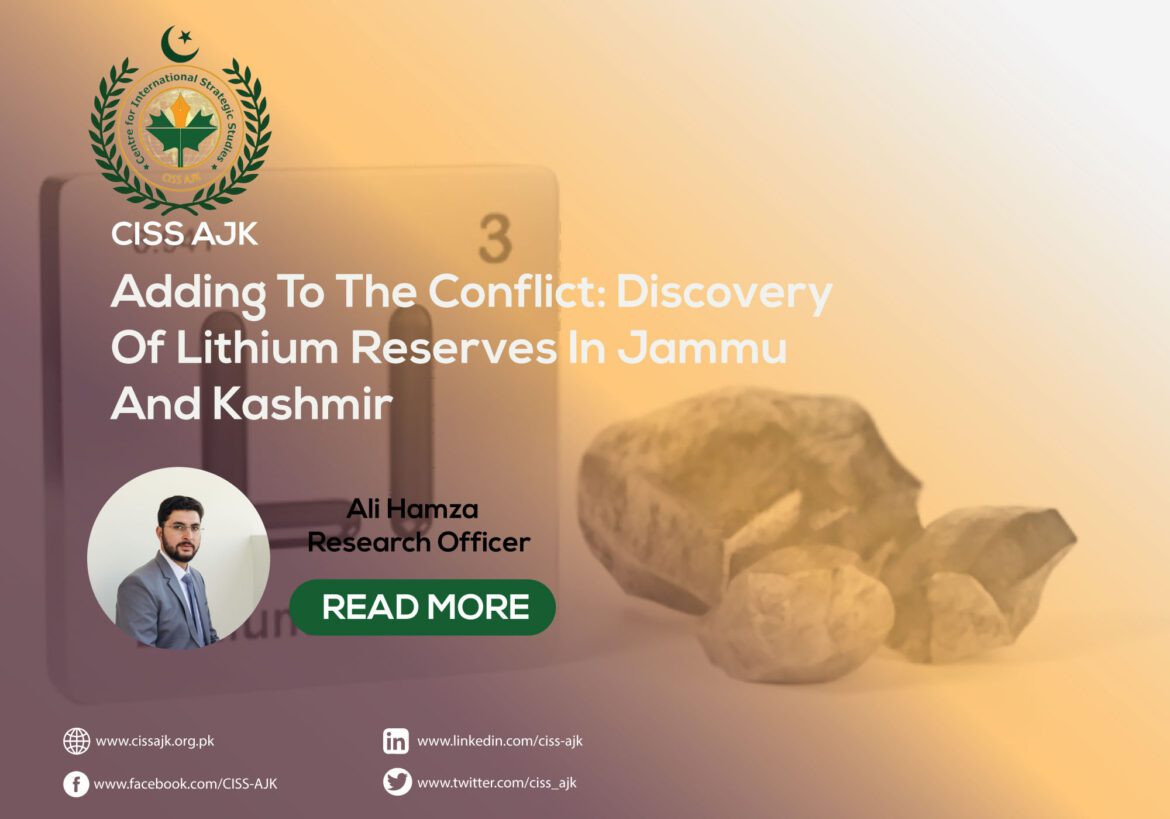780
In recent years, lithium – a key component in batteries used in various electronic devices – has become one of the world’s most sought-after minerals. The demand for lithium has only increased with the rise of electric vehicles, smartphones, and other technological advancements, making it a commodity of great economic and strategic importance. The strategic importance of lithium for a country lies in its role as a critical commodity for the production of high-tech products and the energy transition to renewable energy sources. Having access to a reliable and secure supply of lithium can enhance a country’s competitiveness in the high-tech industry, which is an increasingly important sector of the global economy. Lithium production can also contribute to the country’s economic growth and job creation.

Jammu and Kashmir has always been considered a region possessing extensive mineral resources. There is certainly an economic aspect of the dispute as well because India completely relies on the region for various minerals to be converted into essential commodities. These resources are substantial for India, domestically as well as for earning foreign exchange. In a surprising turn of events, vast reserves of lithium have been discovered in the disputed region of Jammu and Kashmir. This discovery has the potential to change the balance of power in the region and add a new dimension to the long-standing conflict between India and Pakistan.
Jammu and Kashmir, located in the northern part of India, is one of the country’s most politically sensitive regions, with India and Pakistan both claiming control over it. The discovery of lithium deposits in the region has added a new layer of complexity to the already volatile situation, as both countries now view the mineral as a potential source of revenue and a bargaining chip in the ongoing territorial dispute. While India insists that Jammu and Kashmir is an integral part of it, it does not subscribe to the notion that the issue should be discussed anymore. However, Pakistan strictly adheres to the narrative of considering the region disputed. Pakistan will be seriously concerned on the discovery and utilization of lithium reserves in a region that still requires a credible solution.
Lithium is a soft, light metal that is used in batteries to store energy and power electronic devices. The metal is vital to the production of laptops, smartphones, electric vehicles, and various other high-tech products. With the global demand for lithium expected to continue to rise, the discovery of new deposits is a significant event for the countries in which they are located.In Jammu and Kashmir, the discovery of lithium deposits is viewed as a game-changer. The mineral is believed to be present in large quantities in the area, which could potentially make India and Pakistan two of the world’s largest producers of lithium. This would have far-reaching economic and geopolitical implications, not just for the region, but also for the world at large.
For India, the discovery of lithium reserves in Jammu and Kashmir is a huge economic opportunity. The country has been working hard to reduce its dependence on oil imports and to transition to a more sustainable energy future. Lithium is seen as a critical component in this transition, and the discovery of large reserves in the country is a major boost to India’s efforts to become a major player in the global lithium market.In addition to its economic benefits, the discovery of lithium in Jammu and Kashmir also holds strategic importance for India. The country has been locked in a territorial dispute with Pakistan over the region for decades, and the discovery of lithium has given India a new bargaining chip in the ongoing negotiations. By controlling the supply of lithium, India could potentially exert greater influence over Pakistan, which is also dependent on the mineral for its own technological and economic development.
For Pakistan, the discovery of lithium in Jammu and Kashmir is both a challenge and an opportunity. On the one hand, it has the potential to deepen the conflict with India over the region. On the other hand, it presents Pakistan with a chance to become a major producer of lithium, which could provide a much-needed boost to its economy and technological development.Pakistan has been working hard to diversify its economy and to reduce its dependence on oil imports. The discovery of lithium in Jammu and Kashmir is an opportunity for Pakistan to take a major step forward in these efforts, but it is also a source of concern. If India controls the supply of lithium, Pakistan’s access to the mineral could be limited, which would have serious implications for its economic and technological development.
The discovery of lithium reserves in Jammu and Kashmir has the potential to change the balance of power in the region and to add a new dimension to the long-standing conflict between India and Pakistan. In the coming years, the development of these reserves will likely be closely watched by the international community. The most probably scenario is the reinvigoration of the heated conflict in Jammu and Kashmir. The discovery of this precious metal has raised the stakes further in Jammu and Kashmir for India and Pakistan.

Ali Hamza
The writer is an MPhil student at Quaid-I-Azam University and can be reached at alihamza0345@gmail.com.



